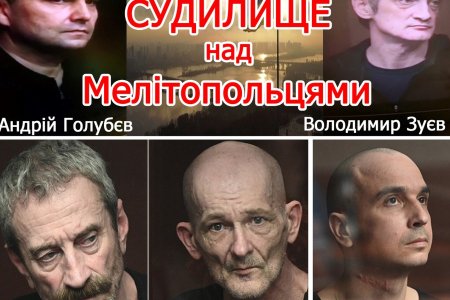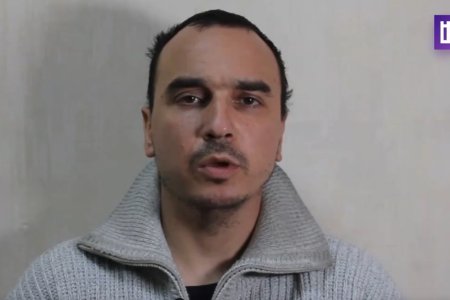
Vladyslav Vidlatsky will be turning 21 in June 2025, his third birthday in Russian captivity. He was just 17 when Russia began its full-scale invasion of Ukraine and 18 when, on 10 May 2023, he was abducted by the Russian invaders from his home in occupied Melitopol. Russia is now staging a ‘trial’, with the young Ukrainian patriot facing a sentence of up to 20 years for supposed ‘state treason’ with respect to Russia.
Vladyslav is from the small town of Nove, around 5 kilometres from Melitopol. At the time of Russia’s full-scale invasion, he was in his first year at the Tavria State Agrotechnological University in Melitopol and was renting accommodation in the city. He was forced to continue his studies online because of Russia’s invasion and occupation but continued to live in Melitopol. The inclusion of ‘treason’ charges against the young Ukrainian is especially cynical. Russia has very aggressively foisted its citizenship on all occupied territory, with it near impossible to get work, hold on to legally owned property, receive medical treatment, etc. without a Russian passport. Young men who do so are, however, at risk of being forcibly conscripted or mobilized into Russia’s army, and of insane ‘treason’ charges for remaining patriots of Ukraine.
Both Vladyslav and his girlfriend, who was also 18, were abducted on 10 May 2023, when men in plain clothes, and wearing balaclavas burst into his apartment. They were both taken away, with black bags over their heads. His girlfriend was released a few days later, obviously terrorized and traumatized. She has since shunned any contact with Vladyslav’s family.
Vladyslav remained in Russian captivity, with his family given no information about his whereabouts. This was not, however, one of the countless cases, under Russian occupation, where families have not even known whether the abducted person is still alive. The Media Institute for Human Rights has learned from Valeria Vidlatska that she continued to have – or believed that she was having – contact with her brother for three days after he was taken prisoner. This was via Telegram, and there is, of course, no proof that it was, in fact, Vladyslav who was writing and not his captors. Vladyslav did, however, also send a video message to Valeria, during which he kept looking upwards, probably at a person in the room who was controlling what he said.
A few days after his abduction, the Russians also carried out a search of his parents’ home. As well as turning everything upside down, they demanded to know why Vladyslav’s mother had not taken Russian citizenship. Several days after this, Russian propaganda channels on Telegram posted a video which claimed to show Vladyslav’s ‘arrest’, but which was, very clearly, staged. His captors did also appoint a ’lawyer’, Natalia Kalmykova, whose contact with the family has been very limited, but whose timely information on one occasion enabled Vladyslav’s father to attend a ‘hearing’ (probably on extending detention) in Melitopol.
According to the Memorial Support for Political Prisoners Project, Russia’s indictment against Vidlatsky and three other men was passed to the Southern District Military Court in Rostov in November 2024. Two brothers – Oleksiy and Hryhory Semykolenko – were seized on 8 May 2023; Vladyslav Vidlatsky on 10 May and 35-year-old Kostiantyn Zinovkin – on 12 May. Oleksiy Semykolenko is accused only of ‘spying’, while the others are all charged under Russia’s flawed ‘terrorism’ legislation.
There are very strong grounds for assuming that all four men were subjected to torture and other illegal duress while held incommunicado. Hostages are very often beaten and subjected to electric current torture to extract ‘confessions’, with ‘judges’ from the Southern District Military Court willing to ignore any number of retractions and accounts of the torture methods endured.
Russian violations lie not only in the use of torture, but in the breach of international law through the application of Russian legislation on occupied Ukrainian territory. Vladyslav Vidlatsky, as well as Hryhory Semykolenko and Kostiantyn Zinovkin, are charged with participation in a terrorist organization’ (Article 205.4 § 2) and with ‘planning an act of terrorism’ (Articles 205 § 3 and 30 §§ 1, 3). As mentioned, Vidlatsky is also accused of ‘state treason’, under Article 275, and of ‘possession, sale, purchase, etc. of explosive devices and substances.
Valeria Vidlatska dismisses any suggestion that her younger brother is some kind of terrorist, saying that “he simply believed in his country”. Melitopol and the surrounding area had been under Russian occupation since soon after the full-scale invasion of Ukraine. He refused to leave “and became even more of a patriot of his own country”. It is for this that he is now facing a potential 20-year sentence



